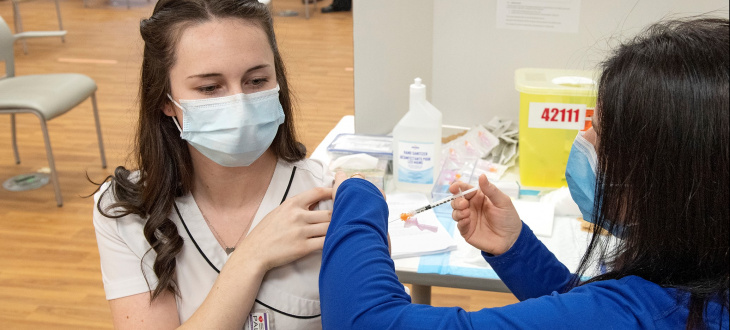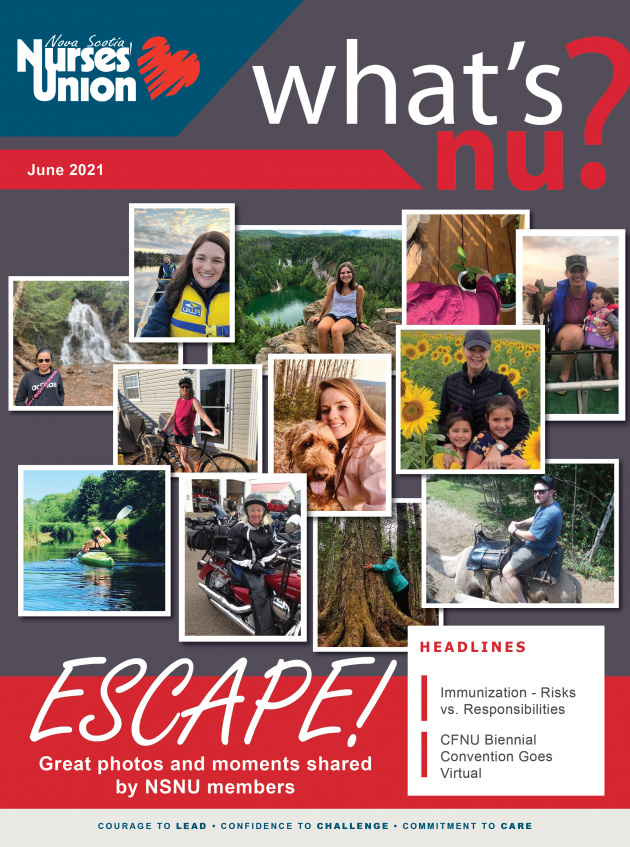By Janet Hazelton, BScN RN, MPA
President, Nova Scotia Nurses' Union
We are now in our 16th month of the COVID-19 pandemic. In March of 2019, as businesses, educational institutions, events, retail and hospitality pivoted to provide only the essentials, no one imagined this new reality would persist for more than weeks or a couple of months, at best. We had no idea just how serious the health crisis was and how severe the impact would be on all aspects of life.
For healthcare workers and other frontline personnel, the impact was even more cruel. On the home front, nurses and others struggled to get groceries, oversee schooling and recreational activities with their children, secure childcare, and safely see extended family while coping with the challenges and undetermined risks they faced on the job.
The risks for those not working in Zoom or Teams or Facetime were real, but to what extent was still unclear in early 2020. We knew, based on the SARS 2007 precautionary principles, that ample access to appropriate personal protective equipment was paramount. Nurses had the right to perform point of care risk assessments allowing each to determine their PPE requirements. The right to refuse unsafe work is fundamental, ensconced in law under the Occupational Health and Safety Act. The NSNU urgently advocated for PPE, safe working conditions and PCRA.
Nurses quickly re-examined their donning and doffing practices, requested N95 fit tests, and limited their contact with the outside world and colleagues – six-feet social and physical distancing became the norm. On the horizon were immunizations that would lead us out of the darkness and back to a more normal way of life.
Here we are today, with a variety of safe and effective vaccines to choose from, strong public health directives to guide us forward, and the willingness of multiple disciplines and sectors to work together to make that happen.
As sporting and concert events south of the border open to tens of thousands of spectators and audiences, I shudder at the thought of so many people in a confined space, without masks and the uncertainty of their immunity to the virus. In recent months, variants cast a huge shadow on our recovery in 2021, sending infection rates, hospitalizations and death counts to record high numbers in some regions, including Nova Scotia.
Our masking and quarantining, isolation and safety precautions aside, historically the best way out of a pandemic is mass immunization. No other remedy has been as effective at eradicating this kind of highly transmissible disease.
Stifling efforts to reach herd immunity are access to vaccines in undeveloped countries and vaccine hesitancy. Access is not an issue for Nova Scotians, however there are many who, for whatever reason, are reluctant to get the immunized.
In a typical flu season, approximately 50% of healthcare workers get a flu shot. Again, the reasons why people choose not to get immunized against influenza are varied and personal. While getting the flu can have consequences for healthcare workers, contracting and spreading COVID-19 is viewed as an altogether other matter which may be met with low public tolerance.
For decades, while promoting flu vaccines, unions have maintained that mandatory flu immunization defies workers’ rights. Again, south of the border and beyond, employers have made immunization a condition of employment – now, even more so in light of the pandemic.
The NSNU does advocate in favour of COVID-19 vaccination; I recently participated in the CFNU campaign This is Our Shot, Canada! NSNU rolled out a vaccine campaign early this year and the response was very positive. I’ve received both my doses of Pfizer for my own safety and that of my family, and in keeping with the campaign theme to reduce the pressure on our health care system.
Decisions made by individuals to not get a COVID vaccine should not be taken lightly or ridiculed. That is not constructive, nor does it respect the rights of others. Instead, we need to understand what factors lead to vaccine hesitancy and how we can dispel the myths, the fears and the shaming surrounding this issue.
Nurses who may still have doubts about the vaccines are encouraged to ask questions. Our staff OH&S Specialist, Justin Hiltz (justin.hiltz [at] nsnu.ca) is available to speak with members who have concerns for themselves and their family members who are not vaccinated. Justin and others in our organization want to talk to members, without judgement.
NSNU is eager to start a dialogue with our members about vaccines. To that end, we will be launching a short survey to probe some of the questions that remain unanswered. We want to know your views on COVID-19 vaccine programs, future booster shoots, vaccine hesitancy, compulsory vaccines for workers and school-aged children, and more pertinent topics. We are seeking to better understand these complex issues and find solutions that work for all members we represent.
It is counterproductive to disparage co-workers and neighbours who have not gotten the vaccine. This is a sensitive subject with the potential to do harm. Experiencing self doubt can have equally harmful outcomes.
Ongoing dialogue is important. I encourage members to contact the NSNU if you have questions. Based on your feedback, I will continue to lobby government and your employers to ensure that you are protected while on the job. Please speak with your primary care provider; they know your medical history and can provide advice that’s specific to your needs. Speak with your employer so that you understand their expectations.
When the NSNU poll is activated, please consider participating. Your answers will be confidential and anonymous and will assist the Nurses’ Union and the labour movement in informing and developing policies that support workers.

 Login Members Only
Login Members Only


